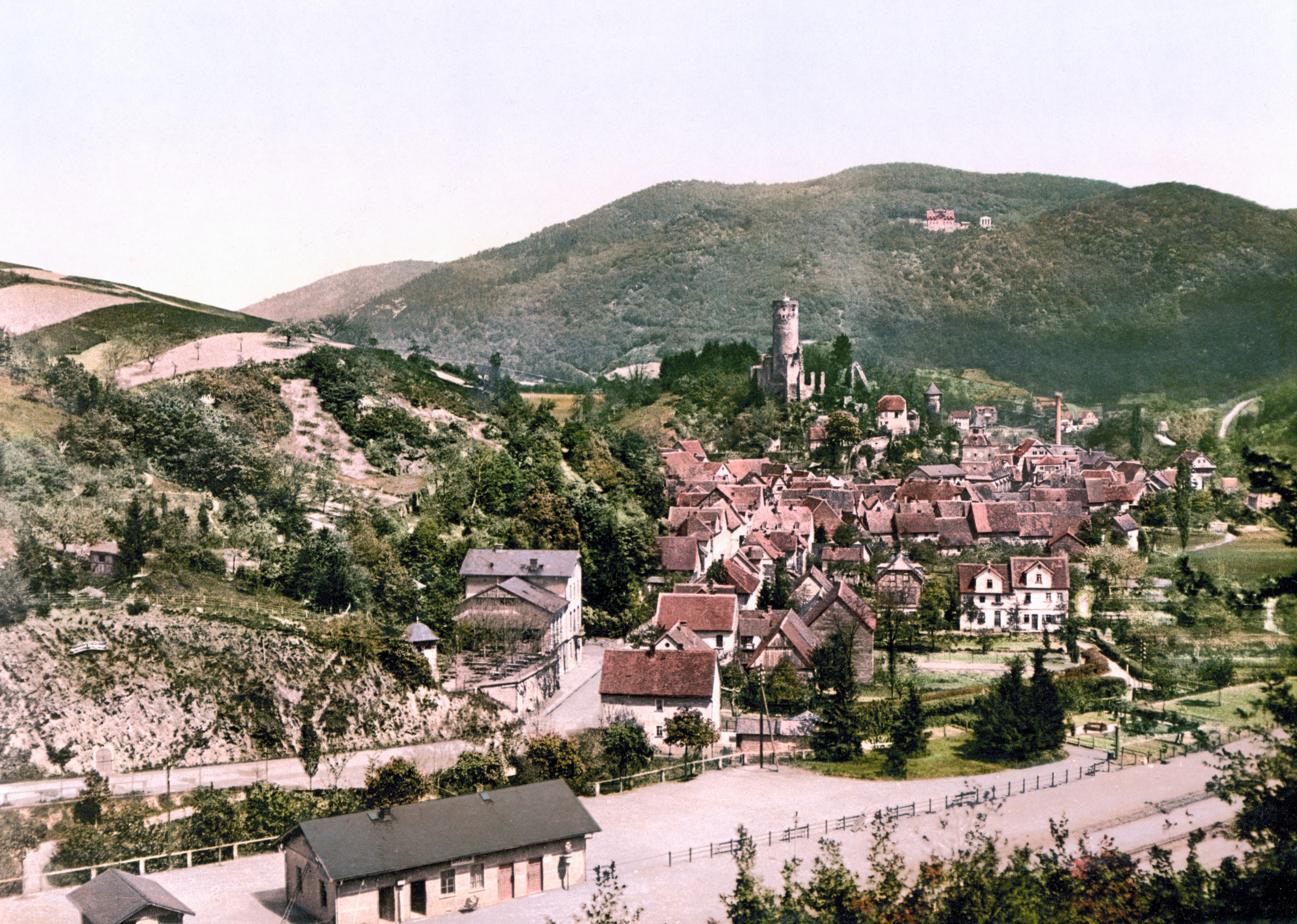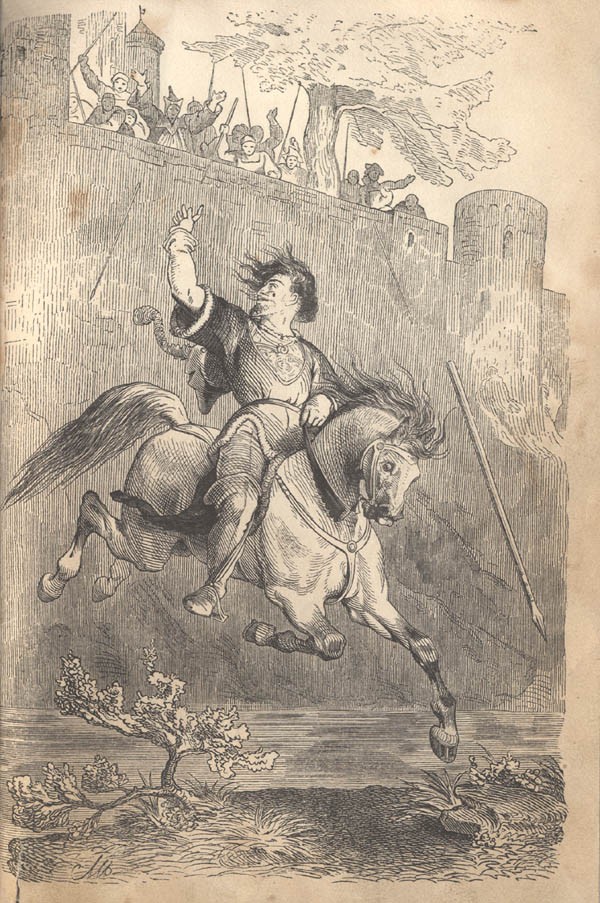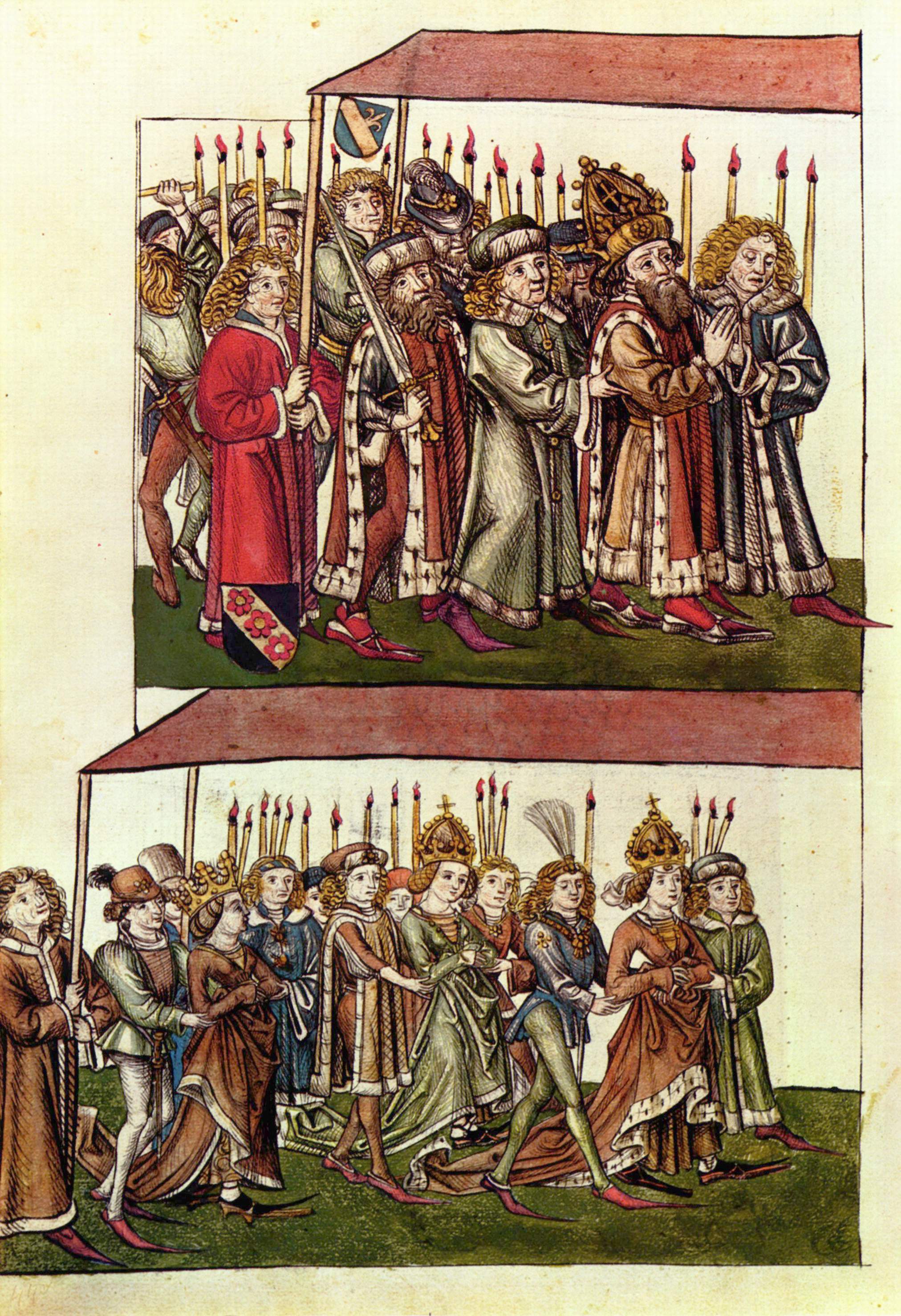|
Reinhard II, Count Of Hanau
Reinhard II of Hanau ( – 26 June 1451 in Hanau) was Lord of Hanau and from 1429 Count of Hanau. He was one of the most important member of the House of Hanau. Youth The exact date of his birth is not known, not even the exact year, because in the Middle Ages a person's death date was considered far more important than their birth date, since a memorial mass would be celebrated on the death date. He was the second son of Ulrich IV of Hanau (born: between 1330 and 1340; died: in September or October 1380) and Countess Elizabeth of Wertheim (1347–1378 ). In the ruling family of Hanau, an explicit primogeniture statue of 1375 stipulated that only the eldest son could inherit the Lordship and even that only he could marry. Reinhard II as second son of Ulrich IV as was destined for a clerical career. He received a suitable education for such a career; in 1387 he was studying at the University of Bologna. In 1390, one of the sons of Ulrich IV, possibly Reinhard II, was enrolled ... [...More Info...] [...Related Items...] OR: [Wikipedia] [Google] [Baidu] |
Ulrich IV, Lord Of Hanau
Ulrich IV, Lord of Hanau (1330/40–1380) was Lord of Hanau from 1369 or 1370 until his death. Based on the estimated year his parents married, he is assumed to have been born between 1330 and 1340. He was the son of Ulrich III of Hanau and Adelaide of Nassau. Reign Ulrich IV succeeded his father when he died in late 1369 or early 1370. The exact date of Ulrich III's death has not been recorded. Imperial policies On 20 March 1371, Duke Wenceslas of Bohemia, acting as the representative of his father, Emperor Charles IV, appointed Ulrich IV as governor of the Wetterau, a position his father had held before him. However, he must have been relieved of his duties later that year, as we find Archbishop John of Mainz on this post in the fall of 1371. Perhaps Charles IV never confirmed Ulrich IV's appointment. During his reign, he was involved in various feuds and regional wars. He was a member of the Star League, a group of territorial lords trying to counter the growing infl ... [...More Info...] [...Related Items...] OR: [Wikipedia] [Google] [Baidu] |
De Facto
''De facto'' ( ; , "in fact") describes practices that exist in reality, whether or not they are officially recognized by laws or other formal norms. It is commonly used to refer to what happens in practice, in contrast with ''de jure'' ("by law"), which refers to things that happen according to official law, regardless of whether the practice exists in reality. History In jurisprudence, it mainly means "practiced, but not necessarily defined by law" or "practiced or is valid, but not officially established". Basically, this expression is opposed to the concept of "de jure" (which means "as defined by law") when it comes to law, management or technology (such as standards) in the case of creation, development or application of "without" or "against" instructions, but in accordance with "with practice". When legal situations are discussed, "de jure" means "expressed by law", while "de facto" means action or what is practiced. Similar expressions: "essentially", "unofficial", "in ... [...More Info...] [...Related Items...] OR: [Wikipedia] [Google] [Baidu] |
County Of Rieneck
The County of Rieneck was a comital domain within the Holy Roman Empire that lay in what is now northwestern Bavaria (in the west of Lower Franconia). It bore the same name as its original ruling family, the Counts of Rieneck, from whom the county and its main seat, the town of Rieneck, got their names. History The first documentary evidence of what is now the town of Rieneck surfaces in AD 790. Rieneck gained its name from the Counts of Rieneck, who founded the line of Burgraves of Gerhart at the end of the 11th century from the ''Vogtei'' over the Archbishopric of Mainz between Neustadt am Main, Lohr am Main and Karlstadt am Main. The family line died out with Gerhard I, Count of Rieneck in 1108. His only daughter married Arnold, Count of Loon (1101–39), inheriting Rienecker territory and, around 1156/7 by Louis I, Count of Loon, the family name, [...More Info...] [...Related Items...] OR: [Wikipedia] [Google] [Baidu] |
Isenburg-Büdingen
Isenburg-Büdingen was a County of southern Hesse, Germany, located in Büdingen. It was originally a part of the County of Isenburg. There were two different Counties of the same name. The first (1341–1511) was a partition of Isenburg-Cleberg, and was partitioned into Isenburg-Büdingen-Birstein and Isenburg-Ronneburg in 1511. The second (1628–1806) was a partition of Isenburg-Büdingen-Birstein. It was partitioned between itself, Isenburg-Meerholz and Isenburg-Wächtersbach in 1673, and was mediatised to Isenburg in 1806. In 1816 Isenburg was partitioned between the Grand Duchy of Hesse-Darmstadt and the Electorate of Hesse-Kassel. Count Ernest Casimir (1801-1848) was elevated to the rank of prince by Louis II, Grand Duke of Hesse, in 1840. Since then, the name of the branch is spelled ''Ysenburg and Büdingen'', to distinguish it from the princes of Isenburg from the Isenburg-Birstein branch. Counts of Isenburg-Büdingen See also *Diether von Isenburg Diether von I ... [...More Info...] [...Related Items...] OR: [Wikipedia] [Google] [Baidu] |
Eppstein
Eppstein is a town in the Main-Taunus-Kreis, in Hesse, Germany. Eppstein lies west of Frankfurt am Main, around 12 km north east of the state capital Wiesbaden, and is at the edge of the Taunus mountains. The ruins of the Eppstein castle is a prominent landmark, and houses a museum. Geography Neighbouring municipalities and areas To the north, Eppstein borders the city of Idstein (Rheingau-Taunus-Kreis) and the municipality of Glashütten (Hochtaunuskreis). To the east is the city of Kelkheim, to the south the city of Hofheim, and to the west the city of Wiesbaden and the municipality of Niedernhausen. City arrangement Eppstein consists of five areas: Bremthal, Ehlhalten, Eppstein, Niederjosbach and Vockenhausen. Bremthal Bremthal has a rapid-transit railway stop on line S2. With approximately 5000 inhabitants, Bremthal is the most populous quarter of Eppstein, and is the economic and cultural centre. Bremthal has several associations e.g. a brass band, Germania singi ... [...More Info...] [...Related Items...] OR: [Wikipedia] [Google] [Baidu] |
Karben
Karben is a town in the Wetteraukreis, in Hesse, Germany. It is situated on the banks of the river Nidda in the Rhein-Main-Gebiet (Rhine-Main area), approximately north of Frankfurt. Division of the town Karben as a unified town was founded in 1970, comprising some smaller villages (Klein-Karben, Gross-Karben, Okarben, Kloppenheim, Rendel, Burg-Gräfenrode, and Petterweil). Infrastructure Karben has two railway stations ( Groß Karben and Okarben) on the Main–Weser Railway and is served by line S6 of the Rhine-Main S-Bahn. It has access to the A 661 autobahn and federal highway B3. The town hall is located in a newer district of Gross-Karben, as is a public swimming pool. The industrial district west of Gross- and Klein-Karben hosts several companies of national and international stature. History Karben is rich in history. The village of Okarben was once location of a Roman military castellum, forming a part of the limes, the Roman imperial border defence network and Karbe ... [...More Info...] [...Related Items...] OR: [Wikipedia] [Google] [Baidu] |
Wetterau
The Wetterau is a fertile undulating tract, watered by the Wetter, a tributary of the Nidda River, in the western German state of Hesse, between the hilly province Oberhessen and the north-western Taunus mountains. Bettina von Arnim writes of Wetterau in her text ''Diary of a Child'' in the chapter "Journey to the Wetterau". Geography The Wetterau is located north of Frankfurt am Main, on the eastern side of the Taunus and south-west of the Vogelsberg. The main part of the region is taken up by the political region Wetteraukreis. The region got its name form the small creek Wetter, but the region is crossed by several other creeks and rivers--for example, the Nidda, Nidder, Horloff and Usa. History The Wetterau has a long history and is one of the oldest cultural landscapes in Germany. It was always a very fertile region and was populous from as early as the Neolithic Age. Artifacts from successive civilizations that populated the area also exist. Prominent discoveries ar ... [...More Info...] [...Related Items...] OR: [Wikipedia] [Google] [Baidu] |
Robber Baron (feudalism)
A robber baron or robber knight (german: Raubritter) was an unscrupulous feudal landowner who, protected by his fief's legal status, imposed high taxes and tolls out of keeping with the norm without authorization by some higher authority. Some resorted to actual banditry. The German term for robber barons, ''Raubritter'' (robber knights), was coined by Friedrich Bottschalk in 1810.Klaus Graf, "Feindbild und Vorbild: Bemerkungen zur stadtischen Wahrnehmung des Adels", ''ZGO'' 141 (1993), pp. 121–154, at 138 Some robber barons violated the custom under which tolls were collected on the Rhine either by charging higher tolls than the standard or by operating without authority from the Holy Roman Emperor altogether. During the period in the history of the Holy Roman Empire known as the Great Interregnum (1250–1273), the number of such tolling stations exploded in the absence of Imperial authority. Medieval robber barons most often imposed high or unauthorized tolls on rivers or ro ... [...More Info...] [...Related Items...] OR: [Wikipedia] [Google] [Baidu] |
Rupert, King Of The Romans
Rupert of the Palatinate (german: Ruprecht von der Pfalz; 5 May 1352 – 18 May 1410), sometimes known as Robert of the Palatinate, a member of the House of Wittelsbach, was Elector Palatine from 1398 (as Rupert III) and King of Germany from 1400 until his death. Early life Rupert was born at Amberg in the Upper Palatinate, the son of Elector Palatine Rupert II and Beatrice of Aragon, daughter of King Peter II of Sicily. Rupert's great-granduncle was the Wittelsbach emperor Louis IV. He was raised at the Dominican Liebenau monastery near Worms, where his widowed grandmother Irmengard of Oettingen lived as a nun. Reign From his early years Rupert took part in the government of the Electoral Palatinate to which he succeeded on his father's death in 1398. He and the three ecclesiastical prince-electors (of Mainz, Cologne and Trier) met at Lahneck Castle in Oberlahnstein on 20 August 1400 and declared their king, Wenceslaus, deposed. On the next day the same four electors met at ... [...More Info...] [...Related Items...] OR: [Wikipedia] [Google] [Baidu] |
Council Of Constance
The Council of Constance was a 15th-century ecumenical council recognized by the Catholic Church, held from 1414 to 1418 in the Bishopric of Constance in present-day Germany. The council ended the Western Schism by deposing or accepting the resignation of the remaining papal claimants and by electing Pope Martin V. It was the last papal election to take place outside of Italy. The council also condemned Jan Hus as a heretic and facilitated his execution by the civil authority, and ruled on issues of national sovereignty, the rights of pagans and just war, in response to a conflict between the Grand Duchy of Lithuania, Kingdom of Poland and the Order of the Teutonic Knights. The council is also important for its relationship to ecclesial conciliarism and Papal supremacy. The council's decrees were formally annulled by Pope Sixtus IV in 1478. Origin and background The council's main purpose was to end the Papal schism which had resulted from the confusion following the Avig ... [...More Info...] [...Related Items...] OR: [Wikipedia] [Google] [Baidu] |
Frederick III, Holy Roman Emperor
Frederick III (German: ''Friedrich III,'' 21 September 1415 – 19 August 1493) was Holy Roman Emperor from 1452 until his death. He was the fourth king and first emperor of the House of Habsburg. He was the penultimate emperor to be crowned by the pope, and the last to be crowned in Rome. Prior to his imperial coronation, he was duke of the Inner Austrian lands of Styria, Carinthia and Carniola from 1424, and also acted as regent over the Duchy of Austria from 1439. He was elected and crowned King of Germany in 1440. His reign of 53 years is the longest in the history of the Holy Roman Empire or the German Monarchy. Upon his death in 1493 he was succeeded by his son Maximilian I. During his reign, Frederick concentrated on re-uniting the Habsburg " hereditary lands" of Austria and took a lesser interest in Imperial affairs. Nevertheless, by his dynastic entitlement to Hungary as well as by the Burgundian inheritance, he laid the foundations for the later Habsburg Em ... [...More Info...] [...Related Items...] OR: [Wikipedia] [Google] [Baidu] |
Albert II, Holy Roman Emperor
Albert the Magnanimous KG, elected King of the Romans as Albert II (10 August 139727 October 1439) was king of the Holy Roman Empire and a member of the House of Habsburg. By inheritance he became Albert V, Duke of Austria. Through his wife (''jure uxoris'') he also became King of Hungary, Croatia, Bohemia, and inherited a claim to the Duchy of Luxembourg. Biography Albert was born in Vienna as the son of Albert IV, Duke of Austria, and Joanna Sophia of Bavaria. He succeeded to the Duchy of Austria at the age of seven on his father's death in 1404. His uncle Duke William of Inner Austria, then head of the rivaling Leopoldinian line, served as regent for his nephew, followed by his brothers Leopold IV and Ernest the Iron in 1406. The quarrels between the brothers and their continued attempts to gain control over the Albertinian territories led to civil war-like conditions. Nevertheless, Albert, having received a good education, undertook the government of Austria proper on t ... [...More Info...] [...Related Items...] OR: [Wikipedia] [Google] [Baidu] |







_-_Korunovace_císaře_Albrechta_II._za_krále_českého_roku_1438.jpg)